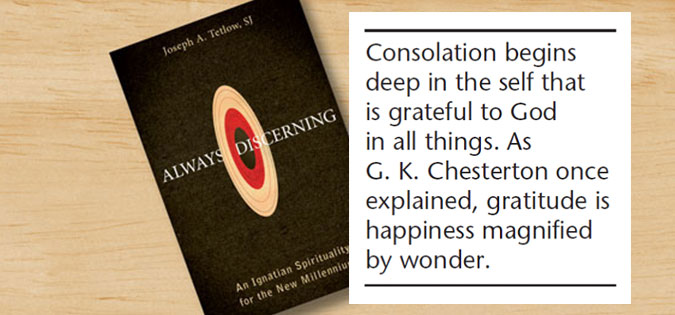 Consolation begins deep in the self that is grateful to God in all things. As G. K. Chesterton once explained, gratitude is happiness magnified by wonder. Jesus’ act at Cana shows how practical gratitude is: in the first place, Jesus intended his friends to be happy and have a good time. He and his mother came to this wedding party to enjoy it. When that enjoyment was threatened, Jesus felt impelled (with a little help from his mother) to show what his disciples could expect: first of all, more wine. They enjoyed the wine, and then they understood the sign: Jesus had revealed his glory; and his disciples believed in him (John 2:11). That is consolation. In everyday life, we feel joy in whatever comes. For whatever comes arrives in the context of God’s overarching care: the earth has yielded its produce; God, our God has blessed us (Ps. 67:6, NJB).
Consolation begins deep in the self that is grateful to God in all things. As G. K. Chesterton once explained, gratitude is happiness magnified by wonder. Jesus’ act at Cana shows how practical gratitude is: in the first place, Jesus intended his friends to be happy and have a good time. He and his mother came to this wedding party to enjoy it. When that enjoyment was threatened, Jesus felt impelled (with a little help from his mother) to show what his disciples could expect: first of all, more wine. They enjoyed the wine, and then they understood the sign: Jesus had revealed his glory; and his disciples believed in him (John 2:11). That is consolation. In everyday life, we feel joy in whatever comes. For whatever comes arrives in the context of God’s overarching care: the earth has yielded its produce; God, our God has blessed us (Ps. 67:6, NJB).
Well, we don’t have parties every day, so how do we experience consolation in everyday life? We feel it in the easy flow of faith and hope and love—head and heart and hands—as we go about doing the next good thing. Consolation keeps us feeling that we are enough and that our life is enough. It lets us sleep well and wake refreshed. We do not fret about whether we are doing God’s will or not. We are not anxious that the world might suddenly end. This hope-filled mind and a quiet heart flow into doing the next good thing even when it is hard or repulsive.
Consolation also comes to us in prayer. On ordinary days we have a fixed time and place to pray, perhaps with the day’s readings. Just managing to keep at this spiritual habit is a consolation. Keeping our attention on God and the things of God is a consolation. And even if we spend time in silence and quiet without thinking much, just being there enacts our belief that God lives, truly loves us, “is mysteriously capable of intervening, that he does not abandon us.”
—Excerpted from Always Discerning by Joseph A. Tetlow, SJ

I don’t remember my mom saying Prayer before Meals. What I do remember was her pressing upon us to give thanks for the food on the table and to always remember those who have not eaten yet even a single meal for the day.
When there is a big storm and we’re all safe and sound in our home, what does she say? “I worry over the squatters who live beside the railways; they have clapboards for their walls and rusty galvanized irons for their roofs that a strong wind is enough to blow down their shovels.”
Perhaps that’s what St. Ignatius has been teaching all along of what it means to identify our everyday consolation be it the simple food during mealtimes, the roof over your head, or the loving relations between and among siblings.
What the mind and the heart tell us, the hands will act on.
What is your consolation for today?
Thank you for the consolation that permeated my soul this morning, reading this article and remembering all is well in Him.
Through all my life, God has never abandoned me.
Thank you for this article.
Thank you! This is a perfect short and inspiring reading. I’ve been reflecting the whole morning about “Sacred Story Spiritual Guidelines” in which consolation and desolation are beautifully explained by William M. Watson, SJ (Sacred Story. An Ignatian Examen for the Third Millennium). Your article gave me more to think. I’m in the very beginning of finding that “fixed time and place to pray” you talked about. Your words are a perfect ending to complement my reading and affirmations! I’ll keep them close by during this 40 weeks! Thank you again!